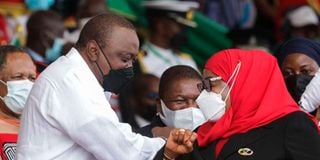Tanzania marks 60 years of independence as fears grow for freedoms

Tanzania’s President Samia Suluhu (right) greets Kenya's President Uhuru Kenyatta during the 60th anniversary of independence day ceremony at the Uhuru Stadium in Dar es Salaam on December 9, 2021.
Dar es Salaam
Tanzania marked its 60th independence anniversary on Thursday, with President Samia Suluhu hailing the country's progress even as fears grow over political freedoms in the East African nation.
The former British colony known as Tanganyika won independence in 1961, officially becoming Tanzania after merging with Zanzibar three years later, and adopting a system of multi-party democracy in 1992.
But in recent years, threats to basic freedoms have increased, particularly under the rule of Hassan's late predecessor, John Pombe Magufuli, who presided over a crackdown on the media, activists and free speech.
In an address to the nation on the eve of the anniversary, Hassan said: "The success we have recorded during the last 60 years of independence was powered by democratic administration and rule of law."
"Our country has... a system that allows citizens to exercise their freedom of expression without any disturbance," she said, adding that conditions for journalists had improved, with the number of media organisations increasing from just one in 1961 to hundreds today.
Since Suluhu took power in March this year, following Magufuli's death, she has sought to break with some of the policies of her predecessor, who was nicknamed "Bulldozer" for his uncompromising leadership style.
"Magufuli's regime was a real setback for Tanzania," political analyst Aikande Kwayu told AFP.
Kwayu acknowledged that Hassan had taken some important steps since her appointment, including the reversal of a ban on pregnant girls and teenaged mothers attending school.
She also reinstated an outspoken Magufuli critic to cabinet and launched a Covid-19 vaccination campaign, a clear departure from her predecessor who questioned the existence and seriousness of the disease.
But the arrest of Freeman Mbowe, leader of the main opposition party Chadema, on terrorism charges, has prompted detractors to openly refer to Tanzania's first female president as a "dictator".
Party divisions
Ringisai Chikohomero, a researcher with the Pretoria-based Institute of Security Studies (ISS), said Hassan was hamstrung by her allegiance to Magufuli's backers in the ruling Chama Cha Mapinduzi (CCM) party.
Although she served as vice president under Magufuli, "she has yet to build her own support base," Chikohomero told AFP.
"She has to toe the party line, otherwise she can be thrown out."
Divisions within the party's ranks have become public in recent days, with Hassan on Saturday accusing internal rivals of trying to smear her leadership with corruption allegations.
In unusually fiery remarks, Suluhu said: "This rot happened under past leaders, but these factions are trying to lay the blame on my government."
In August, the government suspended a newspaper owned by the ruling party for 14 days for publishing a story saying Hassan would not run for office in 2025, the first time the authorities had banned the publication.
Roland Ebole, a researcher with Amnesty International, told AFP: "A lot can be done to make Tanzania more progressive."
"Even when things seem to be opening up, we see things remaining the same."
Parades
Thursday's independence celebrations included a military parade as well as drills by schoolchildren, with foreign leaders including Kenya's President Uhuru Kenyatta and Rwandan President Paul Kagame in attendance.
In her speech late Wednesday, Suluhu extolled Tanzania's economic growth, saying the country had "come a long way".
But opposition leader Zitto Kabwe, head of Alliance for Change and Transparency (ACT Wazalendo), warned that Tanzania still faced many challenges.
"Our nation is 60 years old but we are not politically tolerant, we accuse and even jail each other, we are barred from engaging in legitimate political activities, we are still very poor," he said.
According to the World Bank, the percentage of Tanzanians living on less than $2 a day dropped from around 86 percent in 2000 to just over 49 percent in 2017.
The country's GDP has increased more than tenfold from around $5 billion in 1988 to over $60 billion in 2020, according to the bank.
The CCM has ruled Tanzania since independence.





